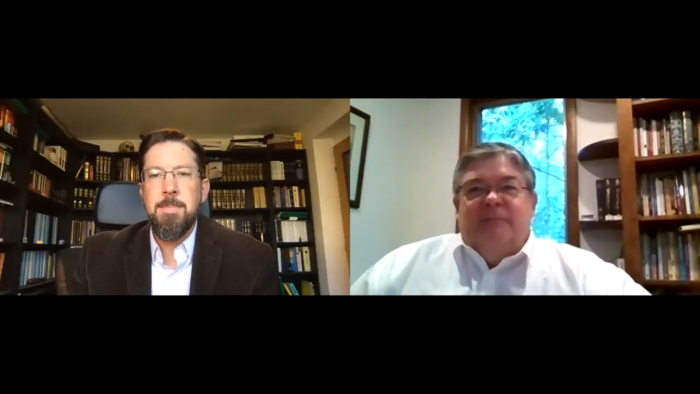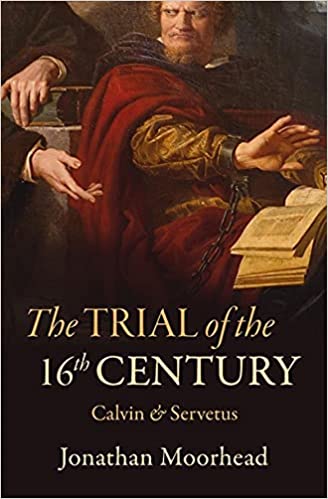An Author Interview from Books At a Glance
Would you like to watch the video interview or listen to the audio? Sign-up today for access to these features and more.
You’ve probably heard about the trial and execution of Michael Servetus in 16th-century Geneva. And you’ve probably heard that it was John Calvin’s fault. But do you know what really happened in the Servetus affair?
Greetings, I’m Fred Zaspel and welcome to another Author Interview at Books At a Glance. Today we’re talking to Jonathan Moorhead about his excellent new book, The Trial of the 16th Century: Calvin & Servetus. He’s done the research, and he’s here to tell us about it.
Jonathan, welcome, and congratulations on an excellent and very needed book!
Moorhead:
Thank you. It is a joy and privilege to speak with you.
Zaspel:
Let’s begin with some background. Who was Michael Servetus? And what were his heresies?
Moorhead:
He is a Spanish physician. He was very precocious. He was very interested in many different subjects but landed in theology primarily. He was eventually condemned for anti trinitarianism and rebaptism which were both punishable by death at the time. As for being an anabaptist at the time a lot of theologians had difficulty distinguishing between the moderate or the more radical utopian and rationalists who would deny the trinity. Servetus is a mix of both of those. He was a utopian thinking he was living in the end times, and he thought he was there to aid Michael the archangel in recovering truth.
As far as the details of his doctrine of the trinity it is quite complex. He evolves over his lifetime, and it is a mixed bag. It is similar when you talk to a cult member today when they redefine terms. Servetus was a modelist who believed there is one person in God who manifests himself in different ways and at different times. We see that today in Pentecostals like T.D. Jakes.
Essentially, he combines things like logos doctrine. This is the early church doctrine that says Jesus was essentially the spoken word of the Father who became the Son of God in his incarnation. He descended as man upon the earth and we too can become sons of God as Jesus did. He also held to no mortal sin that man can commit until you were twenty years old. This was a big debate at the time.
Also, the topic of baptism being salvific came up in his trial. He believed when you place your faith in Christ, even though faith alone does not save you, you are united to the nature of God. God is your spirit. There are hints of a bastardization of the eastern doctrine of divinization or theosis with gnostic tones in there as well where you become God. He changed the meaning of Isaiah 53 and 7 which was particularly upsetting to Calvin and the other reformers. These were some of the more extreme parts of his doctrine but again he was condemned for anti trinitarianism and anabaptism.
Zaspel:
We’ll talk about Calvin and Servetus both in a minute, but I’ve often thought in this debate that we would do well to consider what was “the name of the game” in those days and “the rules in play” at the time. So, describe for us the legal and political context of Europe in those days as it related to heresy and heretics.
Moorhead:
The execution for the heresy of rebaptism and anti trinitarianism goes back early to Constantine and is codified in the code of Justinian in the 16th century. We go on and see Augustine, Erasmus, and others holding to that as a valid and biblical option to execute heresy. This is upheld as the law of the holy Roman Empire; it is ratified at the Diet of Spears.
At this point, anabaptism was spreading and they were already being killed. We go on to the diet of Oxburgh and the Protestants were there, execution is agreed upon there as well. They are all going back to the code of execution for heresy. The only people who argued against this were the heretics. Overall, the major reformation centers participated in execution for heresy.
Zaspel:
Tell us more about Servetus and his behavior that preceded his arrest and execution. By the time we get to the trial in Geneva, he’d been in trouble before. So, tell us about his activism, his record, the kind of man he was, how he got into trouble, and then finally what happened in Geneva.
Moorhead:
As I mentioned before he was a very precocious, smart, gifted teenager. But the difficulty is that his character did not match his ability. That is a struggle for a lot of young men. He was influenced by Judaism and arguments against the trinity. He debated about doctrines and was angry and disrespectful. He wrote his first major work on the errors of the trinity. Servetus could not convince Busser that the trinity was wrong. He returned to Basel and published another book about dialogues on the trinity. He was warned and imprisoned until he recanted of these things and then was expelled. He was not burned or executed, there was a bit of leeway of the magistrates enforcing the law.
Later, these works came to the attention of the Spanish inquisition. They tried to coerce Servetus to come to Spain where he was questioned. He was on the run and was left to study other things. He went to Paris to study and excelled in all subjects. He debated with the top minds. He got in a hang up over astrology. According to him astrology affects the weather, the weather affects human bodies, and based on human bodies they will affect society. He published on these things. At this point, because astrology had a hand at the beginning of the Peasants’ War, it was a big no-no to talk about astrology. He was brought before the courts and was to answer for his work. According to the minutes, he showed no respect for his teachers.
This is foreshadowing how he would treat those in Geneva. His books were banned and burned. It is debated whether he finished his work in Paris at all. He ends up in Vienne, France, and starts working under a pseudonym as a physician. What is interesting is he starts to be the physician of an archbishop.
In the meantime, through the years, he tried to convince Calvin of his beliefs. Calvin was initially responsive. Calvin travelled to Paris to try and convince him of his errors. Servetus did not keep the appointment. As they wrote back and forth, he sent Calvin his book on the restitution of Christianity. The title has humanist overtures. This was an Erasmian type of idea. Everyone in Geneva realized that this book is Servetus’ and someone in Calvin’s circle had a cousin in Vienne. He was a Catholic and he reminded Calvin not to tolerate a heretic in an archbishop’s home. Servetus got to Geneva and is described as hateful towards Calvin and the magistrates there for disagreeing with him. His obstinance was a big part of why Servetus was executed.
 Zaspel:
Zaspel:
Okay, tell us about Calvin’s view of things and his role in the Servetus affair. Take your time if you need to round out the picture for us.
Moorhead:
When Servetus was in Vienne it was Calvin through his friend that offered up these letters that Servetus sent to Calvin. Calvin’s acquaintance said that Calvin did not want to have him condemned. Vienne does not believe heretics should be killed but convinced by doctrine. He still gave the evidence. Servetus escaped and when he got to Geneva he was recognized by brothers from Leon. They got to Calvin, and he was arrested. This was the normal thing to do when a man was on trial. He was eventually convicted and condemned to die by the Catholics. Now he was in Geneva. Calvin knew about all these things.
To uphold the law of his character in Protestantism, Calvin had him arrested. Besides 1538, when Calvin was expelled from Geneva, this was the lowest point in his career in Geneva. He said he had no power or influence and thought he would be fired or killed. Several times he thought about resigning even during the trial. The magistrates were loving it since they were enemies of Calvin. He was humiliated and not in control. When Servetus is arrested, the magistrates showed Calvin who was really in control.
It is during this time he makes his famous statement that at the risk of his life he would not allow someone to come and partake of the table. That was a test for Calvin. He held his ground and the enemies backed off at that point. If Calvin would have been exiled at that point during the trial even followers of Servetus admit that he still would have died in Geneva. Calvin had no say in the trial. He was not a prosecutor; he could not have a weapon. He was just a witness called on by the state to give theological evidence against Servetus. He appealed for a simple beheading and could not get that to pass. It shows how little control he had over the proceedings. These brothers from Leon went and reported to Calvin. He reported him to the authorities. The magistrates physically imprisoned him. He was the reporting agent to the magistrates.
Zaspel:
And there was some political pressure, even outside pressure, on the Genevan magistrates from neighboring Swiss cities also, right?
Moorhead:
Geneva was under the protection of Bern. They were always the protecting city for Geneva. They had significant sway over politics and ecclesiological issues. They let their opinion be known more before closed doors. The official response by Bern, Basil, Schaffhausen, and Zurich was that Servetus should be condemned but not explicit of what the punishment should be. Some gave hints that they knew what the magistrates were supposed to do with this cancer to eliminate him so that he would not infect other churches. The hint was clear that the execution was the answer. Servetus was the one that suggested these Swiss cities be contacted. Calvin thought they were more tolerant. This was not the case. This man was a heretic, and they pushed for execution.
Another point of pressure is that the Catholics knew, and Vienne knew he was in Protestant territory. They had done the right thing by condemning him to death. What are the Protestants going to do? During the trial, Servetus was offered to go back to Vienne. He knew what was coming. The questions were; will Geneva do less than the Catholics? Will they be less zealous for orthodoxy? The irony again is that Calvin’s friend called him out on not being against heresy. This was an opportunity to prove the purity of Protestantism and that they did not condone heresy. If the magistrates would have chosen not to execute Servetus this could have caused military action. The final point is that the magistrates did not want to appear weak before the pastors.
Another significant point that caused the reaction and more pressure for execution was Servetus’ vitriolic behavior. He seemed to be mentally unstable. He was speaking this way to people who had his life in their hands. Perhaps he thought he could align with the magistrates who were against Calvin on many things.
Zaspel:
The debate always surrounds Calvin and his role in the Servetus execution. Was he justified or not in his views and his role? Does this cast a shadow over his theological work? And so on. Give us your own view as it’s been shaped by your research.
Moorhead:
When you read the history books that are pro Calvin the typical answer is that Calvin simply followed the prevailing laws of the time. He was not in control of the trial. He did approve that the execution was the law at the time. As someone who appreciates Calvin, we would have wished that he would have reformed here. There were small voices in the background other than heretics and anabaptists that were questioning this at the time.
Calvin doubled down after the execution and wrote a work on defending the orthodox faith against the doctrine of Servetus’ work. Evidence shows that this is a broader question than Calvin himself. The major Swiss cities agreed in participating in the executions. Many other reformers agreed with this as well. How do we account for the near-unanimous agreement of the reformers of the 16th century? We want to avoid judging the past based on the present. We know what is wrong and right based on modern sensibilities. We talk about this in the book, humility and charity understand that they were reforming.
Human limitedness and sinfulness prevent us from getting it all right. We see this through church history. Humility and charity understand that reformation sometimes takes a long time. The high-priority doctrines are handled. We see others coming slowly behind. If not for the grace of God so go I. Would I really be the soul voice going against these reformed leaders?
All men have weakness and sin. It would be a disservice to whitewash everything. Calvin would want us to learn from his mistakes with grace and care. We can see his failures because we are standing on his shoulders benefitting from the truth that he defended and passed on to us. This points to the one perfect one, the Lord Jesus Christ, who is the sole authority for what we believe. It is not based on any man, but we weigh everything through the Scriptures and the example of Christ.
Zaspel:
Before we let you go, give us a brief overview of your book.
Moorhead:
It is to review the life of Servetus and Calvin as their lives intertwine. Also, to show what lead to the execution of Michael Servetus. A couple of things that stand out is the low position that Calvin had in the trial. He had no control over the magistrates and tried to resign. Because the external pressure of the Catholics had already condemned Servetus on the magistrates, eventually, this led to Servetus’ downfall and very vitriolic behavior. I end it in a doxological note where Christ is the one we look to for truth and hope in his word. As we try to understand what happened I hope it is edifying to us as we think about history and the ethics of writing history and how we are to dialogue with grace, love, and speaking the truth.
Zaspel:
We’re talking to Jonathan Moorhead about his new book, The Trial of the 16th Century: Calvin & Servetus. This was a needed area of work, and he has filled the gap wonderfully – and that in a brief, fascinating, and very accessible read. Please don’t offer too firm an opinion on the matter until you’ve read this great little book.
Jonathan, thanks so much for your good work, and thanks for talking to us about it today.
Moorhead:
Thank you.
Table of Contents
Preface
- Servetus’ Education and Publications
- Servetus’ Arrest and Escape From Vienne
- The Authority of John Calvin in Geneva
- Servetus’ Arrest, Trial and Execution in Geneva
- Final Considerations
- Conclusion
Appendix: Summary
[...]

